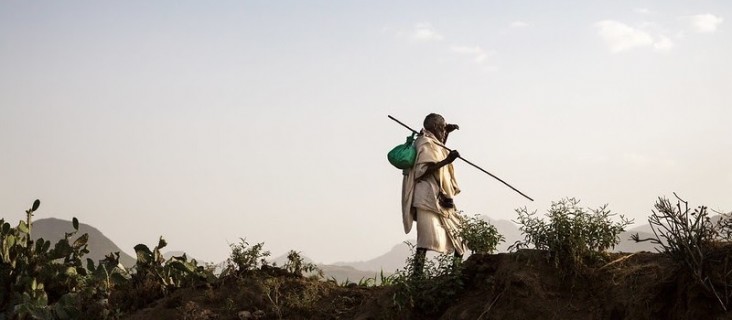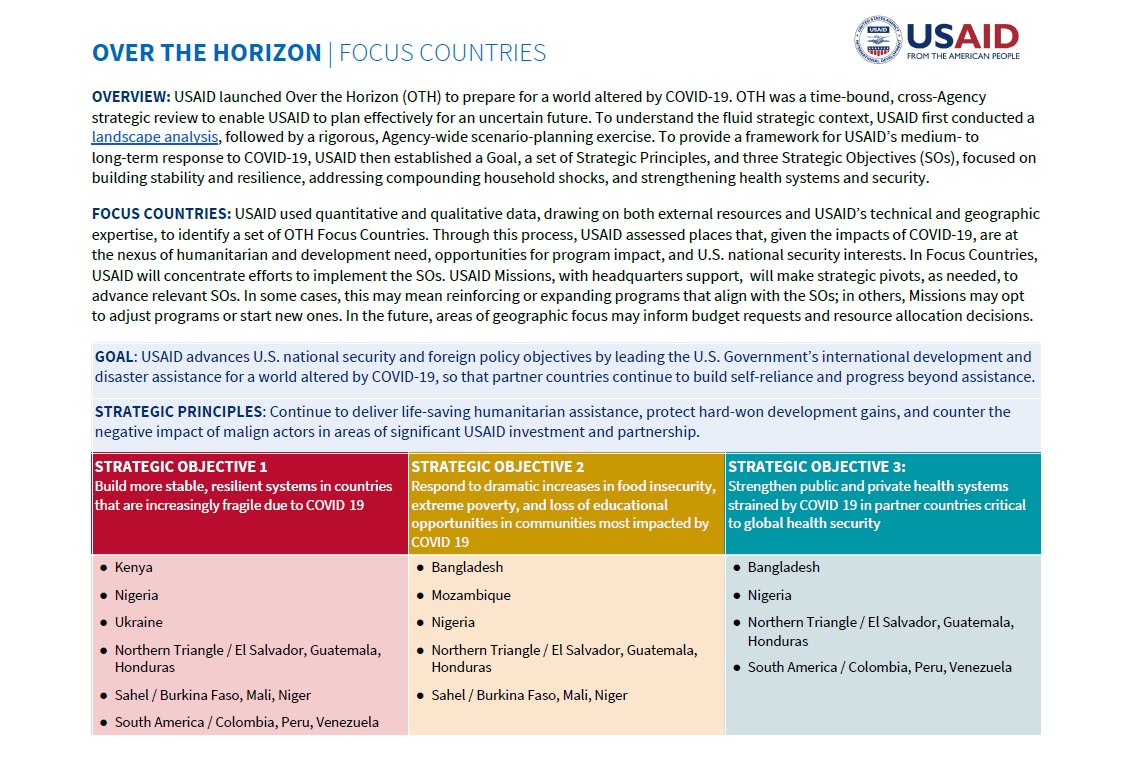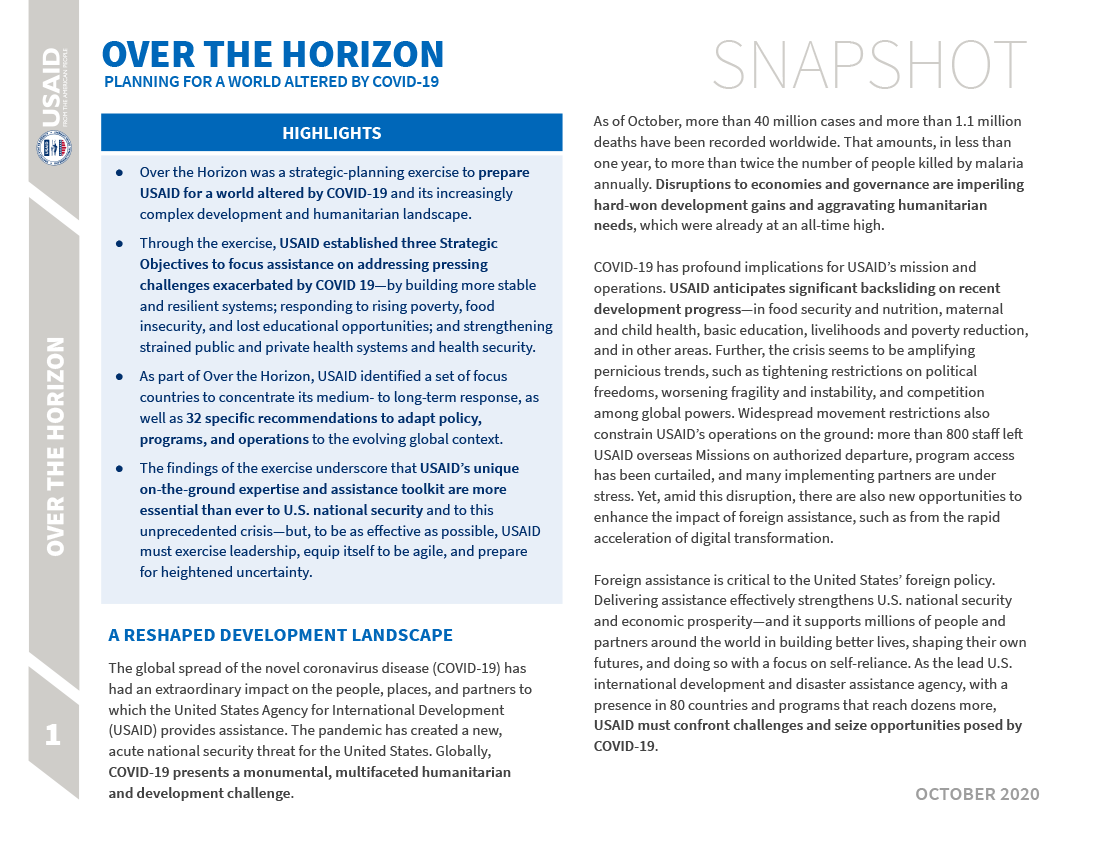- Work With USAID
- How to Work with USAID
- Organizations That Work With USAID
- Find a Funding Opportunity
- Resources for Partners
- Preventing Sexual Misconduct
- USAID Partners
- Acquisition & Assistance Ombudsman
- Acquisition & Assistance Policy Directives
- Development Information Solution (DIS)
- Indirect Cost Rate Guide for Non-Profit Organizations
- Procurement Executive Bulletins (PEBs)
- Progress Report - Fiscal Report 2019
- Implementing Partner Notices Portals
- Partner Vetting System
- Branding
- COVID-19 Guidance For Implementing Partners
- Preparing for a World Altered by COVID-19
- Section 889 Partner Information
- Careers
- Get Involved
Speeches Shim

Over the Horizon Strategic Review
COVID-19 has had—and will continue to have—an extraordinary impact on the people, places, and partners to which USAID provides assistance. In light of this, the Agency must prepare for lasting changes to the development and humanitarian landscape in the medium to long-term. USAID must be proactive, understand what the current landscape and future scenarios in a world altered by COVID-19 look like, and adapt our ways of working accordingly to achieve our mission in a substantially changed global context. To prepare the Agency to meet the challenges and opportunities in a world altered by COVID-19, USAID launched the Over the Horizon Strategic Review.
What is the Over the Horizon Strategic Review?
The Over the Horizon Strategic Review is a time-bound strategic review grounded in a landscape analysis, a scenario planning exercise, and policy, program, and operational data and analysis. It will inform recommendations to the Acting Administrator for changes and improvements at USAID to achieve its goals in a new global context.
Over the Horizon is rooted in USAID’s approach embodied by the Journey to Self-Reliance and its broader Transformation efforts, and is not meant to replace or supersede them.
What does a world altered by COVID-19 look like?
Over the Horizon Landscape Analysis ![]() (pdf - 814k)
(pdf - 814k)
The landscape analysis paper examines how the pandemic is linked to U.S. security and prosperity at home, and the relationship of U.S. national security to humanitarian and development challenges abroad. The landscape analysis examines the five emerging trends below, and serves as the foundation for the Over the Horizon Strategic Review.
A new national security imperative
As mentioned, the COVID-19 pandemic threatens security and prosperity at home, challenges democratic governance globally, and has led to adversaries exploiting the pandemic to compete with the U.S. Three main uncertainties driving change are the prospects for vaccine development, the full dimensions of the global economic fallout, and shifts in governance patterns.
Severe shocks to mobility and the economy
According to the UN and the World Bank, foreign direct investment is expected to plunge by up to $620 billion, or 40 percent, and remittance flows are expected to fall by more than $130 billion this year. The IMF is projecting low growth this year in many developing countries, but especially for lower- middle-income countries, where the World Bank is projecting economic contractions in many places.
A health crisis unprecedented in scale
The COVID-19 pandemic is an acute, global health crisis with millions of cases and close to one million deaths. The Centers for Disease Control and Prevention, American Red Cross, and United Nations agencies estimate 117 million children are at risk of missing measles vaccines; 24 countries have postponed their immunization campaigns.
Rising pressure on governance, democracy, and stability
Two-thirds of countries with planned elections have postponed them due to COVID-19, and 44 countries have issued measures that curtail free expression, according to the International Center for Not-for-Profit Law. Prolonged shutdowns and economic impacts may spark further unrest, and, with disruptions to service delivery, marginalized groups are likely to face discrimination.
Devastating impacts on households
Over the Horizon Focus Countries ![]() (pdf - 576k)
(pdf - 576k)
Current UN projections estimate that global extreme poverty could increase by up to 100 million people this year and 132 million people could be pushed into chronic food insecurity. In addition, the UN estimates that more than 1.6 billion students are affected by school closures in more than 190 countries.
Over the Horizon Focus Countries
The Strategic Review used data, analysis, and expertise to identify a list of 14 Focus Countries. The Focus Countries identify places that, given the impacts of COVID-19, are at the nexus of greatest humanitarian and development need, opportunity for impact, and U.S. national security interests.
A full list of Over the Horizon Focus Countries can be found here.
Over The Horizon: Snapshot ![]() (pdf - 1 MB)
(pdf - 1 MB)
Over the Horizon Final Report Summary
As the Over the Horizon Strategic Review moves to the implementation phase of the initiative, the Agency has prepared this “snapshot” of the final report. The summary includes the Over the Horizon structure, process, strategic context, strategic approach, recommendations, and more. We encourage viewers to review this snapshot, and please check back soon for the final report.




Comment
Make a general inquiry or suggest an improvement.